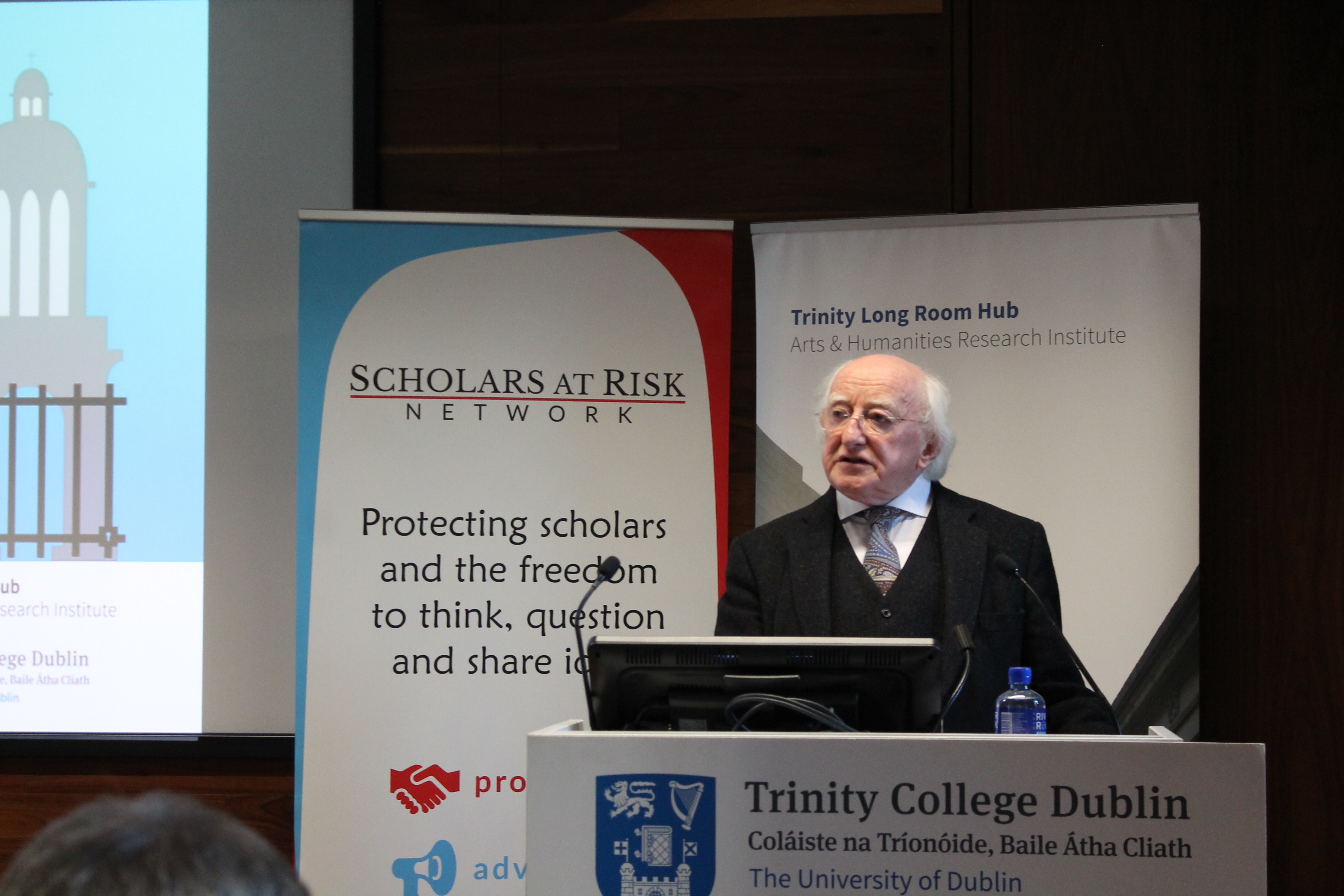“Scholars and universities are not simply the collateral casualties of conflict; they very often are the very focus for such conflict”
-Michael D. Higgins
Established at the University of Chicago in 1999, Scholars At Risk (SAR) is an international network of institutes and individuals who are dedicated to promoting academic freedom and protecting scholars across the globe. The network is comprised of over 450 higher education institutes in over 40 countries, who arrange temporary academic positions to scholars who face serious threats in their home countries, as well as organizing campaigns for academics who have been imprisoned or otherwise silenced, and providing advisory services for visiting scholars and their host universities.
The Ideas Are Not Crimes conference aimed to highlight the growing risks academics face in countries like Syria, Iran, Turkey and others, and the essential role higher education institutes play in democratic societies promoting intellectual debate and enquiry.
Preceding the opening address by President Michael D. Higgins, Provost of Trinity College Dublin Patrick Pendergast and Head of Arts at University College Cork Patrick O’Donovan welcomed him and the scholars to the event.
The President delivered a wide ranging and powerful address, exploring a number of different areas within the general topic of the event. He highlighted the vulnerability of higher education institutes in areas of conflict and in regions where academia is regarded with suspicion: “Scholars and universities are not simply the collateral casualties of conflict; they very often are the very focus for such conflict”, and gave insights into the possible reasons for that suspicion, stating that “authoritarian abusers of freedom” see intellectual enquiry as a threat to their power “whether this power and its projects invoke a distorted and hateful version of religion and faith, or an authoritarian conception of the state”.
He went on to discuss SAR’s most recent report, entitled Free to Think, which recounted attacks on higher education communities in more than 35 countries from May 1, 2015 to September 1, 2016, and referenced Dr. Khaled Al-Assad, a Syrian professor who has beheaded for attending academic conferences with ‘infidels’, among other alleged crimes. President Higgins said of him: “Dr. Khaled Al-Assad was deprived of life and dignity for his commitment to heritage and the educational rights of future generations”.
President Higgins acknowledged the particular difficulties girls face in getting an education, and quoted the Pakistani education activist Malala Yousafzia, before going on to discuss the imprisonment and allegations of terrorism and treason many scholars across the world face in their home countries due to their research and activities as academics.
The President made a number of references to the current political and social climate we face in a post-Brexit and Trump world, evoking “an atmosphere of fading respect for the test of rational discourse, empirical proof, or coherence of logic”. He also highlighted the benefits immigrant scholars can bring to the academic climate: “the movement of scholars across continents is one that never fails to give way to a cross-fertilisation of ideas, a renewed flourishing of knowledge”.
He praised Universities Ireland, the official name for the Irish Section of SAR, as well as the SAR network as a whole, saying they were of “fundamental importance to the present and future of our democracies” and had his “wholehearted support”.
Following President Higgins address, scholars from Iraq, Iran, Syria, Sri Lanka and Turkey recounted their experiences working in higher education institutes in their home countries, and the challenges they faced in the academic sphere due to their government’s mistrust of intellectual freedom and enquiry.
Trinity College is one of ten members of Universities Ireland. Universities Ireland was founded in 2003 and has hosted 12 scholars at risk. It also awards scholarships and bursaries to Irish academics living in the Republic of Ireland and in Northern Ireland, to encourage them to undertake postgraduate study on the other side of the border and thus experience life in the other region. Universities Ireland has also held multiple SAR events across the country, promoting the ideals and the mission of the initiative.









